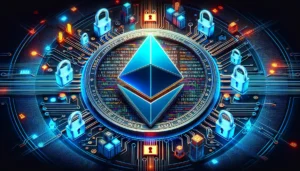The nexus of decentralized finance (DeFi) and smart contracts is forging a new epoch in the annals of financial transactions. With blockchain technology as its cornerstone, DeFi represents a collective stride towards automated agreements and trustless protocols that promise to redefine how we manage and transfer value in the digital age. At the crux of this sea change are smart contracts – the quintessential gears that drive the decentralized machine, powering an ethereum ecosystem where cryptocurrency transactions occur with unprecedented security and efficiency.
Smart contract automation serves as the bedrock upon which programmable financial tools are constructed, crafting a realm where the integrity of a transaction isn’t just expected; it’s encoded. These powerful contractual mechanisms are transforming asset management, landlocking intermediaries in the annals of history, and unlocking a new level of operational efficiency. Yet, this revolution is not unchallenged, as developers grapple with the twin specters of security vulnerabilities and a fluid regulatory landscape, even as they scale the heights of innovation in digital asset management.
Key Takeaways
- Smart contracts are the linchpin of DeFi, enabling automatic and intermediary-free cryptocurrency transactions.
- Blockchain technology begets an immutable ledger, ensuring the permanence and transparency of contracts.
- The Ethereum network plays host to these contracts, written in languages like Solidity, escalating trust through code rather than traditional means.
- Challenges such as coding errors and regulatory ambiguity serve as cautionary tales in the flight of DeFi’s ambition.
- Real-world implementations in platforms like Uniswap and Aave underscore smart contracts’ potency in reshaping finance.
The Role of Smart Contracts in DeFi
The advent of smart contract automation has been a game-changer in the realm of decentralized finance (DeFi). By harnessing the power of blockchain technology, smart contracts have redefined the way cryptocurrency transactions are conducted. These digital pacts enable seamless interactions within the ethereum ecosystem, carve out new pathways for automated agreements, and facilitate the use of programmable financial tools. Bridging gaps and creating a trustless environment, smart contracts proffer a vast array of benefits that make DeFi a robust and viable alternative to traditional financial systems.
Eliminating Intermediaries and Reducing Costs
Gone are the days where every financial agreement required the sluggish and costly involvement of intermediaries. Smart contracts streamline processes, significantly reducing costs for all parties involved. By automating the execution of agreements, smart contracts bring rear-guard intermediaries to obsolescence. The automation extends beyond mere execution; it enforces the compliance of involved parties, ensuring trustless protocols are met without the need for oversight.
Enabling Transparent and Trustless Exchanges
The salient feature of smart contracts lies in the transparency they afford to financial exchanges. This transparency propels a radically trustless transactional atmosphere. With platforms like Uniswap and SushiSwap, which epitomize the transparent nature of decentralized exchanges (DEXs), the risk of market manipulation dwindles. Those buying and selling do so with the confidence that the smart contracts have been impartially and fairly executed, all verifiable in the blockchain’s immutable ledger.

Fostering Financial Innovation Through Programmable Tools
As engines of innovation, smart contracts empower developers and users alike to harness the columniation of programmable financial tools. These tools provide the groundwork for intricate financial models and services that were impractical or unrealizable in a traditional financial setting. Smart contracts are the cornerstone of innovative DeFi applications such as decentralized lending, borrowing platforms, and yield farming protocols. By connecting lenders and borrowers through direct channels and dictating the terms of liquidity provision, smart contracts give life to these novel financial solutions.
Stirring the stagnant waters of traditional finance, blockchain-enabled smart contracts offer a secure, efficient, and trustless ecosystem that reflects the ethos of DeFi. They not only warrant a level of coded trust that upsets the status quo but also herald a sustainable and pioneering financial future.
Decentralized Applications and Protocols Powered by Smart Contracts
The dawn of decentralized finance has unfolded a revolutionary chapter etched with the advancements of blockchain technology and the widespread application of smart contract automation. At the heart of this transformation are smart contracts operating within the vibrant ethereum ecosystem, driving innovation and efficiency across a spectrum of financial services. From the robust decentralized exchanges (DEXs) to intuitive platforms enabling peer-to-peer transactions, smart contracts have become the invisible yet potent force pioneering an access-centric and democratized financial domain.
Smart contracts are more than mere snippets of code; they are the arteries of cryptocurrency transactions that pulsate through the body of DeFi. The following table encapsulates key elements where smart contracts deliver on the promise of frictionless financial mechanics:
| DeFi Application | Function of Smart Contracts | Impact on Decentralized Finance |
|---|---|---|
| Decentralized Exchanges (DEXs) | Automate trades, manage liquidity pools | Provides platform for secure and transparent trading directly from personal wallets |
| Lending & Borrowing Platforms | Dictate terms for loans, automate interest and collateral management | Facilitates decentralized credit systems without traditional financial institutions |
| Automated Market Makers (AMM) | Rebalance liquidity with algorithm-based pricing | Enhances liquidity, allowing for efficient token swaps and earning opportunities |
| Yield Farming Protocols | Distribute rewards and govern token staking | Encourages participation and investment in DeFi ecosystems with incentive mechanisms |
These applications exhibit the prowess of automated agreements in reducing complexities and creating transparent systems that encourage global participation. Smart contracts are the silent enablers that champion transactional integrity and operational agility. They epitomize trust and efficiency, ensuring every digital interaction within decentralized finance is recorded on an immutable ledger, offering all stakeholders a verifiable and secure method to perform transactions.
The blend of blockchain technology and smart contracts signals a broader narrative – a narrative of empowerment, inclusivity, and the unleashing of financial innovation. As smart contracts continue to evolve and underpin a multitude of DeFi platforms, they trace the contour of a landscape where limitations are dissolved, and the sovereignty of exchange resides entirely with its participants.

Navigating the Challenges and Future of Smart Contract Integration
As the adoption of smart contracts in decentralized finance (DeFi) accelerates, stakeholders must confront and navigate an intricate web of challenges that threaten to stymie progress. This journey into the next era of blockchain technology is not only promising but also beset with potential pitfalls that demand strategic foresight and perpetual vigilance. In this pivotal stage of growth, addressing fundamental issues and embracing novel developments will be crucial in securing smart contracts’ position within the burgeoning world of DeFi.
Addressing Security Risks and Code Vulnerabilities
The functionality of smart contracts is predicated upon the integrity of their underlying code. However, this digital foundation can harbor security vulnerabilities, making robust audits and the careful crafting of secure smart contracts paramount. As the stakes rise – with DeFi platforms managing billions in cryptocurrency transactions – the urgency for ironclad security measures becomes paramount. It’s a battle that requires not only technical prowess but a proactive approach to safeguard the trustless protocols that lie at the heart of DeFi.
Assessing Regulatory Frameworks for Smart Contract Deployment
Regulatory concerns are a significant headwind facing the proliferation of smart contracts. As government agencies grapple with this groundbreaking technology, the DeFi sector must tread a delicate path, balancing innovation with regulatory compliance. Developing a compliant ecosystem is imperative for the long-term viability of smart contracts, underscoring the necessity for clear, consistent guidelines that will foster growth while supporting digital asset management within legal bounds.
Anticipating Innovations: Cross-Chain Solutions and Privacy-Enhanced Smart Contracts
The horizon of smart contract integration is alight with innovations set to recalibrate the possibilities within DeFi. Cross-chain integration promises a future where assets and contracts freely traverse multiple blockchains, presenting opportunities for unprecedented connectivity and functionality. Simultaneously, the advent of privacy-enhancing smart contracts signals a shift towards greater user sovereignty over data and transactions. These advancements, along with Layer-2 solutions addressing scalability and speed, sketch a vibrant future for smart contracts—a future where technology bridges the worlds of decentralized finance and traditional financial services, offering a hybrid model that caters to a diverse array of industries and applications.
Frequently Asked Questions
| Question | Answer |
|---|---|
| What is the main function of a smart contract? | The main function of a smart contract is to automate and enforce the terms of an agreement digitally. It executes predefined conditions automatically without intermediaries, ensuring transactions are carried out as agreed upon in the contract’s code. |
| What are the risks of DeFi smart contracts? | Risks of DeFi smart contracts include code vulnerabilities that can lead to exploits and financial losses, regulatory challenges due to their decentralized nature, and potential for fraud if not properly audited and secured. |
| What is the use of smart contracts in blockchain? | Smart contracts in blockchain are used to execute agreements securely and autonomously. They ensure trustless transactions, enhance transparency and security, and enable a wide range of decentralized applications, including DeFi platforms. |
| What is DeFi smart contract lending? | DeFi smart contract lending is a process where smart contracts facilitate the borrowing and lending of cryptocurrencies without traditional financial intermediaries. Interest rates, collateral management, and loan repayments are handled automatically by the smart contract. |
Further Reading
| Title | Link |
|---|---|
| Understanding DeFi and the Ethereum Blockchain | Read More |
| Exploring Cryptocurrency Exchanges | Read More |
| Securing the Blockchain: Insights into Blockchain Security | Read More |
| Navigating the World of NFTs | Read More |
| The Inner Workings of Blockchain Technology | Read More |
| Blockchain in Supply Chain Management: A New Frontier | Read More |
| The Cost of Creating an NFT: What You Need to Know | Read More |




